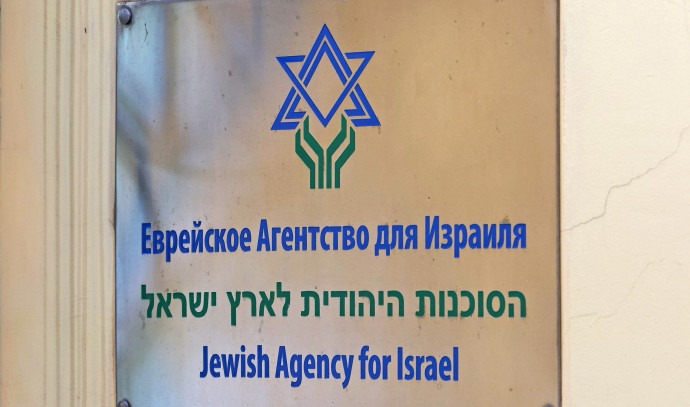Petr
Administrator
Moscow was where I spent my first Yom Kippur away from home. I remember standing, the pit of my stomach yawning ever larger, at the back of the city’s legendary Choral Synagogue, waiting for the start of Ne’ila, worrying that I was so thirsty I might faint. This was because I’d been on my feet for hours, almost all day, as the place was packed. The shining house of a thriving community. As my tired eyes fixed on its vast mosaics, blue and gold, like the night sky, over the Ark — lavishly restored by the kindness of oligarchs — I remember thinking that nowhere else can compare as a barometer of Russian Jews.
That was 2009. This synagogue, the only Moscow shul to operate uninterrupted throughout totalitarianism, once a top target of KGB surveillance, was then a symbol of a Jewish revival. Alas, today it has resumed its historical role as a barometer: for Vladimir Putin’s wreckage of it all.
Nothing captures this better than what happened to Rabbi Pinchas Goldschmidt. Having dedicated his life to rebuilding Russian Judaism, the Swiss-born Chief Rabbi of Moscow of some 30 years fled the country after the community leadership was pressured to issue a statement supporting the war in Ukraine. He refused. Now he has warned that Russian Jews should leave while they still have the chance; like so many times before in Russian history, he said, the Kremlin would inevitably “redirect the anger” that comes from error and failure towards the Jews.
The crowds have thinned at the glorious Choral Synagogue. A community that was once so proud of having refound its voice is relearning Soviet habits of only sharing what you really think about forbidden topics, such as Vladimir Putin and the war, in the safety of your own kitchen.
Packed Moscow high holidays are long gone. Rabbi Goldschmidt has estimated that of the business elites that made up the backbone of the restored community, half had emigrated since Putin first attacked Ukraine in 2014. Census numbers confirm this. In 2010, in the Russian Federation, some 165,000 said they were Jewish; by 2021, only 82,000 did. (Shockingly, there were as many as 5.2 million Jews in the Russian empire in 1897.) The world’s leading expert on counting Jews, Sergio Della Pergola, estimated that the pre-war Russian Jewish population was closer to 150,000, expanding to 320,000 including those with one Jewish parent and 460,000 with their families.
Either way, the numbers have fallen fast since the Ukraine war. Rabbi Goldschmidt has said that up to 30 per cent of the wider community have emigrated or are planning to do so. Others have put the figure at close to half having left Russia behind. Exact numbers are hard to come by but last year, almost 40,000 people made Aliyah from Russia, tellingly over double the figure from war-torn Ukraine. And this exodus is not slowing down. So far this year, over 11,000 Russians have already emigrated to Israel. Given how many of Russia’s creative classes have left for Europe or other former Soviet republics, the overall figure is substantially more.
Russian Jews are already feeling the chill of the far darker and more authoritarian state that has come of the war. Some think it was not an accident that Evan Gershkovich, the jailed Wall Street Journal reporter, whose parents emigrated from the USSR, is Jewish. Others see a pattern in the subsequent arrest of prominent Russian theatre director Evgenia Berkovich, who is also Jewish. Many also point to the rise of antisemitism on state television.
Those emigrating say they see the writing on the wall. Even if what is happening doesn’t end in the worst kind of violence, the war has empowered the military, mercenary groups and intelligence services, none of which can be described as philo-semitic. In an authoritarian society, where connections are everything, at the very least the community is going to be frozen out of a shrinking, sanctioned pie.
Putin has broken a 30-year dream — a joint Russian-American one — that with significant philanthropic support a self-sustaining Jewish community could thrive again in what was once a land central to the Yiddish world.
Optimists pointed to the fact that while there might be only tens of thousands of Jews in Russia according to the census, as many as a million people might be of the kind of Jewish descent eligible for Israel’s law of return. The dream was that, given how deeply Judaism was woven into Russian soil, eventually hundreds of thousands might connect and affiliate loosely and culturally to Jewish identity, replenishing the pews, continually allowing tens of thousands to find their way home.
I felt this — I believed in it, like Rabbi Goldschmidt — when I was studying, living and working in Russia ten to 15 years ago. Now, however, it all seems so naive.
I can see the future of the Moscow community I once joined for Ne’ila, and it looks closer to that of Tehran, not what I knew all those years ago. Small, surveilled, shrinking but doggedly surviving, the coda to a proud history.


